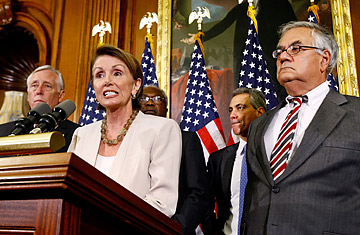
Speaker of the House Nancy Pelosi talks about the failed bailout during a news conference in Washington
(2 of 2)
In the meantime, House GOP factions jockeyed to have their proposals included in whatever new bill is negotiated — many boasting that they (unlike their leaders) can deliver the necessary votes if their ideas are adopted. Jeb Hensarling, chairman of the Republican Study Committee, a group of fiscal conservatives in the House, sent a letter to the group's 100-plus members advocating their involvement in a solution. "House conservatives have authored many alternatives that would work if only the Administration and the Democrat majority are willing to meet us halfway," Hensarling wrote. Representative Darrell Issa pushed a plan that he has advocated since the beginning of the meltdown to issue recovery bonds. And other ideas were also being touted again, such as loaning the money to Wall Street firms rather than buying their toxic mortgage-backed assets, plus an insurance scheme whereby Wall Street firms would pay to have the securities insured rather than taken off their hands.
House Democrats have two choices: move the bill further to the right to try and get more GOP votes (but risk alienating more Democrats) or forsake bipartisanship altogether and write a bill they like (with such provisions as more aid to ailing homeowners) that can garner enough Republican votes in the Senate and pass without input, or support, from House Republicans. Pelosi, however, has all along stressed the need to have bipartisan support for such a controversial bill only five weeks before Election Day. And some political observers argue that the Dems have very little incentive to take such a risk now that Republicans will likely be widely blamed for the market collapse.
An alternate route, described by two aides as a "nuclear" option, is for the Senate to pass a measure first, then adjourn and force the House to accept the Senate measure. Such a move would need to be attached to an innocuous tax bill already pending before the Senate in order to circumvent a constitutional mandate that all tax writing must originate in the House. "We always keep tax bills available for such situations," said Jim Manley, a senior adviser to Senate majority leader Harry Reid. "But I don't see that happening as of right now."
Coming to a new agreement, however, will require getting past some very bruised feelings. The GOP leadership was quick to point outraged fingers, citing Speaker Nancy Pelosi's closing speech before the vote as breaking the bipartisan spirit of the proceedings. "The Speaker had to give a partisan voice [sic] that poisoned our conference, caused a number of members we thought we could get to go south," Boehner ranted to reporters after the vote — as if partisan speeches had never before been heard on the House floor.
The Democrats struck a slightly more dignified tone. "There's a terrible crisis affecting the American economy. We have come together on a bill to alleviate the crisis," House Banking Committee chairman Barney Frank told reporters in a press conference around the corner. "And because somebody hurt [the Republicans'] feelings, they decide to punish the country. I mean, I would not have imputed that degree of pettiness and hypersensitivity."
More than any individual member on Capitol Hill, no one has more to lose in this debacle than John McCain. By claiming to suspend his campaign and pledging to help bring House Republicans on board, McCain put much of his political capital on the line — to the point that his staff were already claiming credit for the legislative coup Monday morning on the assumption that it would pass. "This is very bad for McCain," said Clyde Wilcox, a government professor at Georgetown University. "So he interrupts his campaign to fly to Washington to deliver a deal, and then cannot deliver his party? This suggests that everyone is running for cover on this."
McCain was almost as quick to throw blame around as his GOP colleagues, and his target was, no surprise, Barack Obama. "From the minute John McCain suspended his campaign and arrived in Washington to address this crisis, he was attacked by the Democratic leadership: Senators Obama and Reid, Speaker Pelosi and others," said Doug Holtz-Eakin, a McCain senior policy adviser. "Their partisan attacks were an effort to gain political advantage during a national economic crisis. By doing so, they put at risk the homes, livelihoods and savings of millions of American families."
Obama, predictably, swiped back at McCain. "This is a moment of national crisis, and today's inaction in Congress as well as the angry and hyperpartisan statement released by the McCain campaign are exactly why the American people are disgusted with Washington," Obama spokesman Bill Burton said in a statement. "Now is the time for Democrats and Republicans to join together and act in a way that prevents an economic catastrophe." Given Monday's blame game, the odds of both sides rising to the occasion don't look very good.
(See Wall Street's worst days here.)
(See the ten steps to the financial meltdown here and TIME's photos of the global financial crisis here.)
